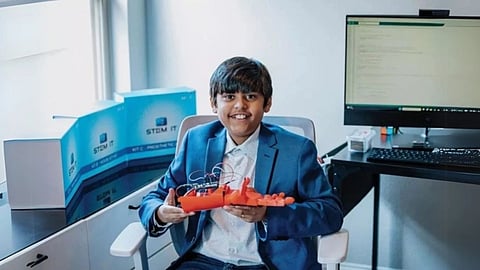
- HOMEGROWN WORLD
- #HGCREATORS
- #HGEXPLORE
- #HGVOICES
- #HGSHOP
- CAREERS
- ABOUT US
- CONTACT US

Siddharth Nandyala, a 14-year-old Indian-American computer prodigy, recently awed the world by developing an artificial intelligence (AI) powered app, CircadiaV, which can detect heart diseases in seven seconds using a smartphone. The tool, tested on over 15,000 patients in the U.S. and 700 in India, analyzes heart sounds through a phone’s microphone to identify irregularities such as murmurs or arrhythmia with a reported accuracy of 96%.
The Texas-based teenager began coding at age 9 and earned certifications from both Oracle and ARM as the world’s youngest AI engineer by 12. He was motivated to build CircadiaV as an accessible, early diagnostic tool by the loss of his grandfather to undiagnosed heart failure. Siddharth traveled to Andhra Pradesh, India — where his father hails from — to conduct clinical trials at the Guntur Government General Hospital. The app’s efficacy was validated there, particularly in rural areas with limited medical infrastructure.
Last month, Andhra Pradesh Chief Minister N. Chandrababu Naidu met Siddharth to discuss scaling CircadiaV, pledging his administration's support for its further development. Siddharth emphasized that the app aims to assist, not replace, medical professionals, positioning it as a preliminary screening tool for underserved communities.
Beyond CircadiaV, Siddharth also founded STEM IT, an initiative promoting global STEM education by training students across the world in coding, robotics, and AI through online tutorials. He is concurrently developing a low-cost prosthetic arm controlled by bioelectrical brain signals, aiming to drastically reduce production costs from $400,000 to approximately $300 to make prosthetics more affordable to amputees in developing regions. Siddharth’s parents, both IT professionals in USA, initially expressed concern over his extracurricular projects but now support his work, citing the tangible impact of his innovations on underprivileged communities.
While some medical experts caution against over-reliance on experimental AI diagnostic tools like CircadiaV, cardiologists involved in CircadiaV’s clinical trials note its value as a preliminary screening device, particularly in resource-limited settings.
In a country where a vast majority of the population lacks consistent access to healthcare, Siddharth’s application — trialled in both USA and India — underscores a growing trend of diaspora-led innovation addressing systemic gaps, transcending geographic and generational boundaries.
If you enjoyed reading this, here's more from Homegrown:
A Homegrown Creator Has Engineered A Tamagotchi-Inspired Escape From Doomscrolling
Indian Tech Company Praan's New Smart Air Purifier Is (Literally) A Breath Of Fresh Air
Meet The Indian Computer Scientist Leading The Race To Decode Sperm Whale Codas
